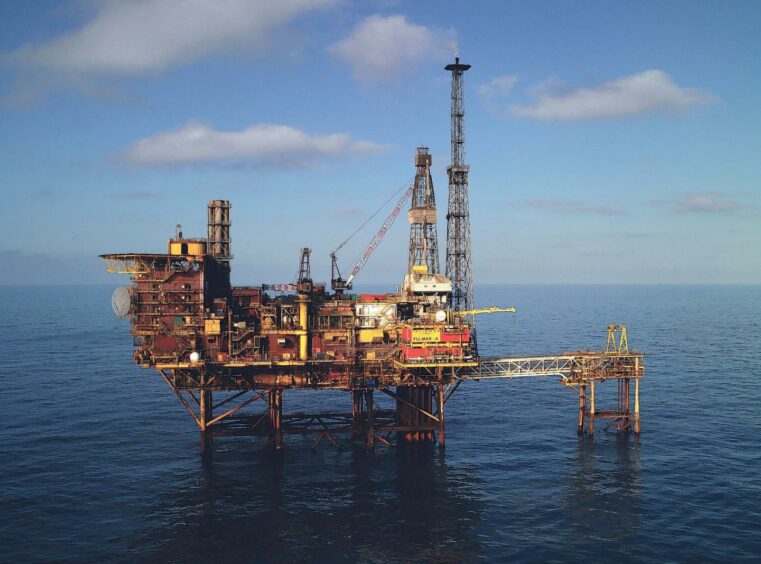
Repsol Sinopec Resources UK (RSRUK) says it expects to spend nearly $3.6 billion on decommissioning over the next thirty years, according to company filings.
The London-headquartered group – a joint venture between Spain’s Repsol and Chinese petroleum giant Sinopec – made the disclosure in annual accounts filed with the UK’s corporate registrar Companies House.
Recording its performance and liabilities for full-year 2021, RSRUK estimated that its future costs of abandonment totalled $3.59bn (around £3bn today) over the next 32 years.
While the amount is lower than the $3.77bn projected as of the end of 2020, the company expects nearly $2.4bn (£2bn) of this will be incurred over the next ten years, as assets move towards the end of their life.
That includes plans to abandon some 140 wells by the end of 2025, the company’s decommissioning manager Teresa Munro told an event in Aberdeen earlier this year.
Most of the wells are associated with four fields – Beatrice, Buchan, Saltire and Tartan – which have already ceased production, but also include a 32-well campaign at the Fulmar and Halley fields.
Contract awards for this work are expected early next year.
RSRUK was asked whether it is likely to be able to claim tax relief on the headline sum. Typically companies can claim around 40% relief on their decommissioning bills, reclaimed from corporation tax (30%) and supplementary charge (10%) paid over the asset’s operational life.
2021 results
Elsewhere in its filings, RSRUK reported pre-tax profits of $142 million for full-year 2021 (around £117.5m today). The results marked a considerable turnaround from the company’s pre-tax loss of $745m the previous year.
Group-wide revenues also increased, reaching over $1bn last year compared with around $800m the previous year – largely the result of improved commodity prices and activity following a year of COVID-related disruption in 2020.
The increase came despite a notable decline in group-wide production, which fell from around 51,500 barrels of oil equivalent per day (boepd) to just over 37,900 through full-year 2021.
The company blamed “production challenges” on its Scapa, Piper and Flyndre assets, as well as the cessation of production at the Tartan field and its satellites in November 2020.
Alongside its financial reporting RSRUK charted a drop in its Scope 1 emissions from 1.3m tonnes of CO2 equivalent (CO2e) in 2020 to 1.08m tonnes in 2021. Its corresponding emissions intensity also fell from 39.98 tonnes CO2e per thousand boe in 2020 to 35.42 tonnes last year.
Though some of this improvement is likely related to the shut down of Tartan, RSRUK also notes the preparation of a company roadmap which would put it “in line with or better than” with the UK-wide goal of net zero by 2050.
Various internal asset transfers were completed throughout the year, although the company also exchanged its entire one-third equity interest in the Affleck field for a 65.9% share in the Flyndre field in a deal struck with NEO Energy, which it said led to a net gain of $18.3m.
Further internal asset deals have been made in 2022, including moves to transfer stakes in Tweedsmuir, Tweedsmuir South, Blake, Clyde, Leven, Medwin and Nethan between various RSRUK entities.
Recent months have also seen the appointment of a new CEO for the company, as Nicolas Foucart replaced Jose Luis Muñoz in August.
In a statement published Wednesday Mr Foucart added: “Our aim is to continue to deliver against our corporate strategy, which is focussed on safe and sustainable oil and gas production, efficient decommissioning, and Net Zero, which for us means emissions reduction whilst contributing to the UK’s domestic energy supply.
“In 2021 our focus was to review our asset strategies to define clear development roadmaps and to identify opportunities for each asset. This was done within a continuing challenging operating environment.”
Windfall tax impact
Finally, Repsol Sinopec also calculated the implications of the first wave of the UK Energy Profits Levy (EPL), which placed an additional 25% tax on oil and gas profits as of late May 2022.
The company said it expects a $60.2m (£49.8m) liability to be paid in December 2022 and January 2023, while a $87.2m (£72) deferred tax charge will be incurred across the group.
The projections do not take into account the upward revision of the windfall tax from the beginning of 2023 as unveiled in the government’s Autumn Statement.
Asked as to the impact of the revised levy, a Repsol Sinopec spokesperson said: “We are disappointed with the Energy Profits Levy (EPL) introduced in May 2022 and the recent announcement that it is to be increased from 25% to 35% and extended from 2025 to 2028.
“The EPL adversely impacts funds available to invest and investor confidence in general.”
Recommended for you
